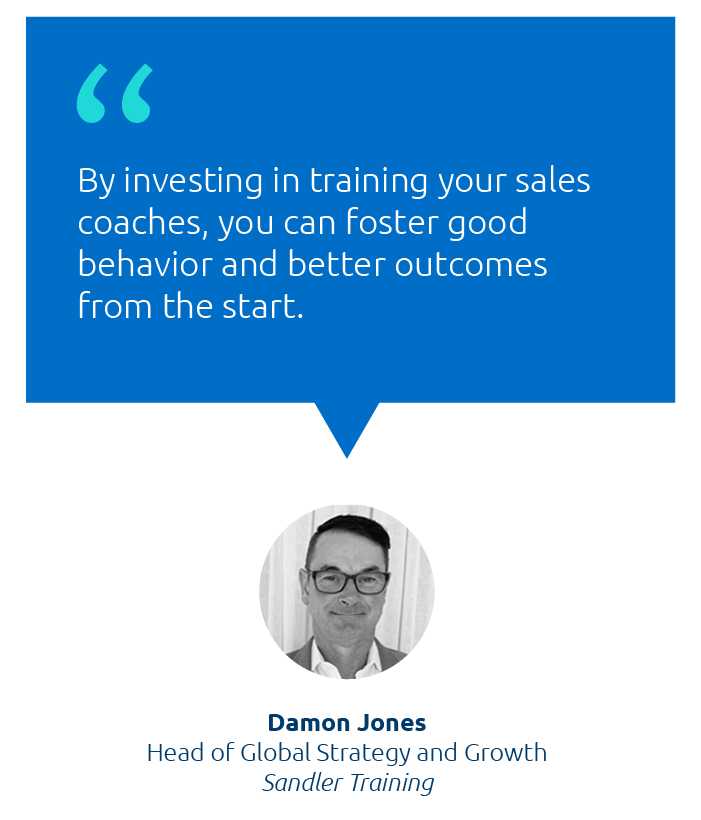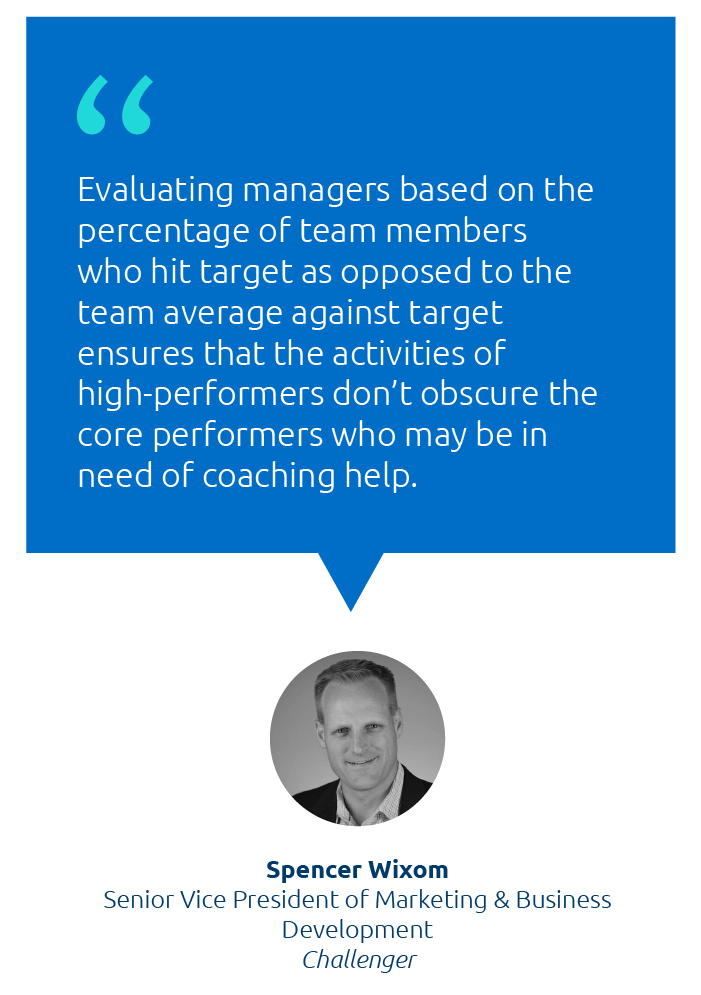Clear eyes, full hearts, can’t lose — for the fictional players of Friday Night Lights, Coach Taylor’s iconic words have heralded victory more than a few times. For fans of the show, his pre-game speech is a reminder of the impact a great coach can have.
From delivering winning doses of inspiration to transforming rookies into all-stars, coaches are a key component of any winning team — and not just in sports. In the world of business-to-business sales, coaches are just as essential to ensuring reps have the sales skills they need to close deals with confidence.
In this guide, we’ve teamed up with leading sales training and service providers Sandler Training, Challenger, and Corporate Visions to share everything you need to build a sales coaching program with impact, including:
- What is sales coaching?
- Why is sales coaching important?
- How do you coach and develop a sales team?
- Top sales coaching techniques
- What makes a sales coach great?
- How to measure sales coaching effectiveness
- Best practices for sales coaching

What Is Sales Coaching?
Sales coaching is the process of evaluating and mentoring a salesperson one-on-one to improve sales performance and drive consistent sales success. An effective sales coaching program led by sales leaders and managers helps reps self-diagnose deficiencies, enabling reps to take greater ownership of their performance and improve their outcomes.
In the scheme of sales training and sales readiness, coaching lives between sales onboarding and sales training. While onboarding happens at the onset of a job or during periods of transition, sales coaching, like training, should be a continuous process. But unlike training scenarios in which a manager typically leads discussion on broad initiatives and tactical skills, coaches should listen more than they talk to help reps uncover issues on their own.
As the role of a salesperson has shifted from “seller” to “trusted advisor,” coaching engagements have become increasingly important. This process of development allows reps to grow soft skills, such as communication or negotiation, which are difficult to master in a traditional classroom or online scenarios, but necessary to delivering a modern buying experience.
Why Is Sales Coaching Important?
With so many other training and sales methodologies in play, why add coaching into the mix? The simple answer is because it works.

Spencer Wixom, Senior Vice President of Marketing and Business Development at Challenger, explained, “When you ask reps what most enables their success, they say it’s implementing and applying learnings via one-to-one interactions with an experienced mentor.”
Yet, despite touting the benefits of sales coaching programs, very few companies have a formal investment in place. Coaching is often approached on an ad-hoc basis — a new rep asking a tenured one for advice, for instance. These interactions are useful, but programmatic coaching distributes its benefits to a broader audience: the salesperson, the sales manager, and the buyer.
For sales reps, coaching provides the space needed to address deficiencies in core competencies. The process of self-discovery is difficult to achieve in group settings like team meetings, where some reps may hesitate to publicly share failures or top sellers may dominate the conversation. Through effective coaching, sales reps are given the space needed to explore areas of improvement and the guidance to make meaningful change — and ultimately unlock better sales performance.
For sales managers, the targeted support that coaching provides ensures that no team members slip through the cracks during more general training. As a result, sales managers should see better outcomes across the entire sales cycle, stronger working relationships with their direct reports, and higher retention.
For customers, they receive better, more consultative vendor engagements from highly capable reps — something every buyer who has suffered through a terrible sales call knows is invaluable.
How Do You Coach and Develop a Sales Team?
While some ad-hoc coaching will certainly happen, a structured sales coaching process ensures that all reps benefit equally. This means that sales coaches must have the tools and content they need to coach programmatically, not opportunistically. At its most basic level, this guidance would include a list of activities that coaches should facilitate on a daily, weekly, or monthly basis. Activities might include:
| Daily Activities | Weekly Activities | Monthly Activities |
|---|---|---|
|
|
|

Each activity listed above should have a corresponding “activity checklist” that coaches can use to guide the conversation.
Far from being heavy-handed, granular guidelines and other standardizing frameworks help develop less seasoned coaches, regulate the cadence and quality of activities, and allow easily quantifiable metrics to be gathered and analyzed.
That said, a great coach will also tailor engagements to support individual reps’ needs in any given situation. Empower coaches with sales playbooks for organic topics, like negotiation, messaging, persuasion, upselling, cross selling, and competitive differentiation, to ensure coaches can effectively respond to issues as they arise.
Top Sales Coaching Techniques
There are many different coaching techniques you can use to put these activities into play. Generally, your approach should look something like this:
Self-Diagnose through Discovery
Coaches who regularly review rep data and observe activities will typically be aware of a problem before a rep. During this first stage, it’s important to guide to a rep to self-diagnose an issue by asking targeted questions, such as:
- What would you like to explore today?
- What went well about a customer engagement?
- What could be done differently?
- What are the benefits of changing?
- What are the consequences of not changing?
Be sure to focus on the behavior changes and skillsets you hope to see a rep adopt — items like remembering to log notes in Salesforce or your CRM are activity changes and should be addressed separately.
Plan for Future State
Once opportunities for improvement have been identified, it’s time to discuss what the future state will look like. Again, your job is to guide the discussion, not dominate it. Ask questions like:
- What does good look like in this scenario?
- What will it take to get there?
- What will stop you from achieving this state?
- How can I help you achieve this state?
These questions allow the rep to explore their own potential and encourage them to take ownership of changes without fear of failure or punishment.
Create an Action Plan
Next, work with your rep to create a plan of action. Write out the steps the rep will need to take to achieve their desired future state. These include:
- 1-3 immediate actions to facilitate change
- Timeline for progress check-ins
- Expected date of goal completion
Put your action plan documentation in a shared location. You’ll want to revisit this record to check on progress down the line.
Support and Energize
Once you’ve determined your action plan, take a moment to step back and listen to what your rep needs from you to be successful. Now is the time to offer encouragement and positive feedback. Ask your rep questions like:
- Is there anything I can clarify?
- How do you feel about this plan?
- Are there other topics you’d like to address?
- Are there additional areas where I can support you?
Keep in mind: your goal is to encourage behavior change. Feedback, especially when negative, is difficult to receive. The most encouraging and supportive you can be during coaching sessions, the better.
Follow Up
In the following coaching sessions, be sure to use your action plan as a guide to assess progress and make changes as necessary. Check in with questions such as:
- How are things going?
- Do you feel like you are making progress?
- What new obstacles have arisen?
- What changes do we need to make to our plan?
Work together to review progress, offering additional feedback and encouragement as you go. Once the rep had effectively adjusted behaviors, reward them with praise and by sharing their best practices with other team members.
What Makes a Sales Coach Great?
Coaches walk a delicate line. You must be firm enough to shift behavior while open enough to help reps feel comfortable discussing shortcomings with you.

Most managers aren’t born knowing how to do this. But just as a great rep is taught how to sell, anyone can become a good coach — they just have to learn how.
According to Damon Jones, Head of Global Strategy and Growth at Sandler Training, “Too much of sales management is telling sales professionals what to do as opposed to letting salespeople do their own self discovery and learning. By investing in training your sales coaches, you can foster good behavior and better outcomes from the start.”
A formal sales coaching program should therefore develop and certify managers with advanced coaching skills before they engage with reps. By the end of their training, a great coach should understand how to:
- Ask questions to prompt self-discovery of issues
- Use data and observation to identify performance gaps in reps
- Create an environment that fosters open, honest conversation
- Motivate and incentivize individuals, not just teams
In practical application, here’s how these skills contribute to great coaching.
| A great sales coach: | A poor sales coach: |
|---|---|
|
|
You may notice a pattern here: act early, act often, act with empathy. At its core, that’s all great coaching really is.
 Sandler Training’s Global Head of Content, Mike Montague, summed it up nicely: “There are no bad salespeople, only bad coaches. It’s the coach’s job to understand what a rep needs in order to be successful — and deliver it.”
Sandler Training’s Global Head of Content, Mike Montague, summed it up nicely: “There are no bad salespeople, only bad coaches. It’s the coach’s job to understand what a rep needs in order to be successful — and deliver it.”
How to Measure Sales Coaching Effectiveness
According to Tim, the primary goal of sales coaching is “ensuring reps have the ability to articulate value at every stage of the buying journey.” With this in mind, you can measure the impact of sales coaching by measuring the effectiveness of the sales rep, the completion of sales coaching activities, and certain cultural trends.
Performance Metrics
To measure the impact of coaching via rep effectiveness, you can track metrics such as:
- Percentage of team members who meet or exceed quota attainment targets
- Individual deal size and profitability
- Individual rates of retention and renewal
- Individual size and frequency of upsells
Performance data like the above examples can reveal deficiencies in individual rep behavior and allow you to remedy them with point solutions. “Evaluating managers based on the percentage of team members who hit target as opposed to the team average against target ensures that the activities of high-performers don’t obscure the core performers who may be in need of coaching help,” said Spencer. Check these metrics frequently to proactively support reps before they — and the business’ bottom line — miss their mark.
Observational Activity Metrics
In addition to looking at salespeople as a reflection of coaching, you can track what Spencer describes as “downward feedback” — which is how “directors and second line managers observe a front-line manager’s coaching behaviors” against the checklists and frameworks mentioned earlier. Understanding whether or not prescribed sales coaching guidance has been followed has two benefits. First, it helps the business understand the impact of their coaching kits: if nobody adopts the guidance, it’s probably not very useful. Additionally, when a coach’s team fails to meet their goals, a director can determine whether or not the coach followed the guidance — and know if the coach failed his team, or if the reps performed poorly for other reasons.
Cultural Metrics
Finally, you can measure cultural markers to understand the effectiveness of coaching efforts. These metrics include:
- Rate of attrition
- Percentage of salespeople who are promoted
- Rep satisfaction with job, management, and company
These are important data points because of the personal nature of the coaching relationship. Bad coaches can make or break a salesperson’s experience at a company; if high performers are leaving for other opportunities, this intel will let you know if a coach was to blame. Conversely, if previously low performers are now being promoted, a great coach can likely take credit.
Together, measuring these categories of data will provide a holistic view into the ability of a coach to drive revenue, motivate their team, and grow your business.
Best Practices for Sales Coaching
Enhance Coaching with Technology
As with any other aspect of sales, coaching can be enhanced with the right technology.
 Said Colum Lundt, Chief Revenue Officer at Sandler Training, “We encourage teams to use conversational intelligence platforms to analyze calls, and then use that data to facilitate role-plays and call reviews.”
Said Colum Lundt, Chief Revenue Officer at Sandler Training, “We encourage teams to use conversational intelligence platforms to analyze calls, and then use that data to facilitate role-plays and call reviews.”
Along with conversational intelligence, teams should use sales enablement platforms that have dedicated sales coaching functionality. That allows you to have a 360-degree view of each rep’s performance and team performance with engagement kits and tips at the ready when they need them. Just as a rep may use a sales enablement tool to find the best content for a buyer, a sales coach should also be empowered to quickly discover relevant content — such as calling recordings of sales conversations or playbooks — and effectively engage reps.
Plan and Prep, then Prep and Plan Some More
It’s impossible to over-prepare for a coaching session. This is time that would otherwise be spent selling, so coaches must respect the rep’s commitment and ensure they use sessions wisely. According to Damon, Head of Global Strategy at Sandler Training, a manager “sharing a couple of ideas isn’t coaching.” Rather, each engagement should be “intentional” and “purposeful.”
Prior to each session, coaches should have reviewed the recommended playbooks or content kits and have a coaching plan in place. This ensures that as they work with reps, they are strategically guiding the rep to recognize and make a specific behavioral change — and ultimately improve sales success and performance.
Coach the Way Reps Actually Sell
In the digital world, most sales calls are done virtually over the phone or a conference call. Yet most sales coaching is done face-to-face.
 Tim Riesterer, Chief Strategy Officer at Corporate Visions, suggests that coaches observe and coach in the same environment their sellers use. If they sell virtually, coaches should listen to calls and coach ways to perform better in online meetings. If your reps primarily sell in-person, coaches need to perform ride-alongs to observe and coach on performance in those moments.
Tim Riesterer, Chief Strategy Officer at Corporate Visions, suggests that coaches observe and coach in the same environment their sellers use. If they sell virtually, coaches should listen to calls and coach ways to perform better in online meetings. If your reps primarily sell in-person, coaches need to perform ride-alongs to observe and coach on performance in those moments.
Tim added, “Dedicated coaching should help sellers do well in the environment sellers most often find themselves in.”
Tailor Your Engagements Using Data and Observation
Blanket solutions seem like a good answer to “helping” reps meet their number — it’s a one-and-done application, and nobody’s feelings get hurt. Effective, right? Wrong. Without targeted solutions, reps will continue to make the same mistakes as always and resist change. Rather, coaching sessions should be tailored to address issues the coach has noticed through data-driven analysis and observation.
For example, “If Mary is an unscrupulous discounter, she needs help with negotiation. If Harry doesn’t have enough pipeline to meet quota, he may need help prospecting. But, if Sally has a lot of stalled deals, she needs help with providing a business case and closing,” Tim explained.
This type of “situational intervention” as Tim calls it, ensures that “reps get assistance based on what they need to hit their number this year.” Overall, it ensures better outcomes for teams, and avoids leaving struggling reps out to dry.
Coach Everyone, Not Just Poor Performers
Many managers hire salespeople with the assumption that they are innately good at sales — isn’t that why they pursued this career in the first place? But even when a top performer is crushing quota on a quarterly basis, there is always more to be learned, and additional skills that can be improved.

As a coach, it may be tempting to focus your efforts on the bottom of the pack, but spending time with middle and top sellers can yield additional benefits.
Regularly engaging with middle and top sellers keeps reps’ skills up-to-date with modern sales techniques, and helps capture additional revenue streams that without additional coaching, may have remained unattainable.
Separate Coaching from Managing
A sales manager wears many hats, and coaching is just one of them. Blurring the lines between these roles, however, can lead to poor performance in both. “Managers can naturally bring a ‘tell’ posture to coaching interactions,” said Spencer. “But it’s not about them, it’s about their people.”
If you bring that mindset into a coaching scenario, you’re unlikely to allow reps to “self-diagnose” and “take ownership” for development, he added.
Avoid mixing the two motions by designating time for each. Set aside weekly one-on-ones where you can be a manager and discuss areas, like performance, or career development. Once that meeting has ended, put your coaching hat back on — and focus on leading reps to water.
Coach Your Team, Grow Your Business
Using the sales coaching tips and techniques outlined above, you can build a coaching program that effectively improves your whole sales organization, from growing your reps, to boosting retention, to securing your bottom line. Like Coach Taylor said, clear eyes, full hearts, can’t lose — it’s time to start coaching.
Get started today with these top tips and examples for building effective coaching and sales enablement programs.


